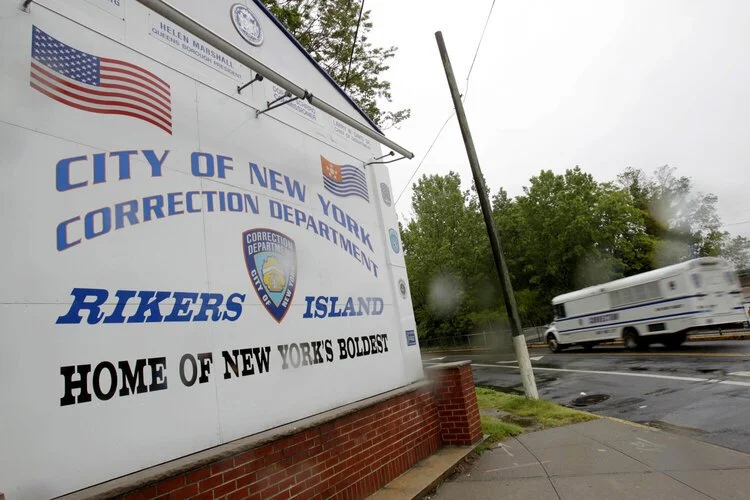City Council demands DOC do more to prevent suicides
/The City Council held an oversight hearing on mental health resources and suicide prevention in Rikers Island on Friday, April 29, 2022. AP file photo by Seth Wenig
By Rachel Vick
Candie Haley spent most of the three years she was detained on Rikers Island in solitary confinement. During her 1,122 days alone, she repeatedly attempted to take her own life and recalls times when officers looked on, laughing.
“I tried to commit suicide every day… using anything I could,” Haley said during a City Council Committee on Criminal Justice hearing Friday.
Though she was cleared of her charges and is working to heal her mental health, she says she has not been freed from the memories of her experience in the facility.
“There's no cure for nightmares – some days I just think I'm still in solitary and this is a dream I’m free,” she added. “I sat there tortured for over three years for them to say, ‘Not guilty, go home.’ But I had no home to go to.”
The oversight hearing covered suicide prevention in the city jails through the lens of two new bills to increase transparency and change the Department of Correction’s policy around mental health services.
A bill from City Councilmember Carlina Rivera \ would require the creation of a plan for the DOC and Correction Health Services — which works with Health + Hospitals — to ensure incarcerated individuals can always attend medical appointments. Councilmember Keith Powers' bill would mandate DOC report all of its rules, policies and directives.
The first panel to testify Friday was made up of individuals impacted by suicide and self harm in connection with time spent inside the DOC facilities like Haley, instead of agency officials, who typically kick of City Council hearings.
Akeem Browder, whose brother Kalief committed suicide after being wrongfully detained on Rikers as teenager, joined Layleen Polanco’s sister Melania Brown to condemn the continued need to fight for rights to protect individuals whose lives — like their late siblings — are being put on the line, they said.
“Please keep in mind we as advocates, as parents, as families — this isn't the first of our stories to be heard. Conversations are great… but action means everything,” he said. “Take action to preserve and uphold life and humanity. Kalief Browder did not deserve to be tortured.”
“My youngest brother did not go into the system with mental illness but he came out with mental illnesses,” he added. “I can't keep on asking.”
A 2020 study from Cornell University analyzing Danish prisons found that former inmates who spent time in solitary were 60 percent more likely to commit suicide than their general population counterparts. Another from the Halt Solitary campaign from 2015 to 2020 found the suicide rates in New York state’s prisons were 46 percent higher htan the nation average.
Coucilmembers on the call questioned DOC officials on policy for suicide watch and mental health evaluations, with officials explaining that each correction officer is trained in first aid and is under orders to immediately intervene should they spot the behavior in action.
Detainees are assessed for their degree of self-harm risk and placed either in a one-to-one situation, in Clinical Alternative to Punitive Segregation or Program to Accelerate Clinical Effectiveness.
About half of the jail’s population is currently receiving mental health treatment.
Commissioner Louis Molina said he remembered the despair he felt when his family member was incarcerated, acknowledging the work he inherited as the helm of an agency struggling to juggle staffing issues and detainee needs.
“Our jails are a reflection of our community,” he said. “The people that work and live in our jails come from our communities and bring issues experienced by our communities with them to our facilities. We cannot talk about issues related to mental health without acknowledging the larger context which is that all New Yorkers collectively experienced tragedy and loss over the last two years.”
He cited a “system disinvestment in our jails and staff” as part of the current issue and mentioned the request for additional officers as the city works to swap out solitary with the Risk Management Accountability System, approved by the Board of Correction in June 2021.
Implementation of the system was delayed during the final months of former Mayor Bill de Blasio’s administration and has continued under Mayor Eric Adams.
“If leadership at its highest level does not hold people accountable, the lack of accountability trickles down.. and does nothing but normalize mediocrity,” Molina added.
Councilmembers pointed out that the agency has among the highest budgets in the city and has more officers per-person than any other correctional system in the country — reminding officials of numerous reports from the federal monitor determining that personnel is not the cause of Rikers' dysfunction.
Advocates and lawmakers also expressed concern about the new RMAS system, which they say is more similar to the traditional solitary model than it is different. Some pointed out that the DOC’s mental health policies, while sufficient on paper, often do not play out as effectively inside Rikers.
“The devolving conditions at Rikers contributed to the uptick in suicides and self-harm incidents. But this crisis is not a new one,” Rivera said during a rally earlier that morning. “For years now, for decades, people have suffered lack of access of medical and mental health care and the insufficient supervision of and support for people at risk of suicide.These failures have only been exacerbated by the department’s mismanagement of staff and resources.”




